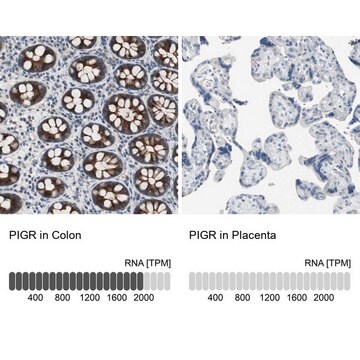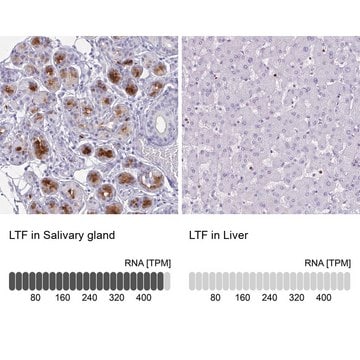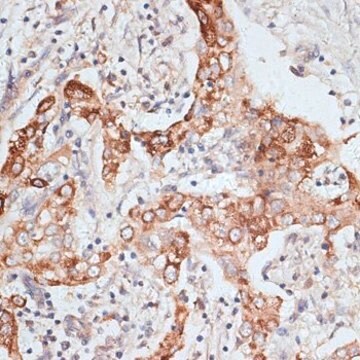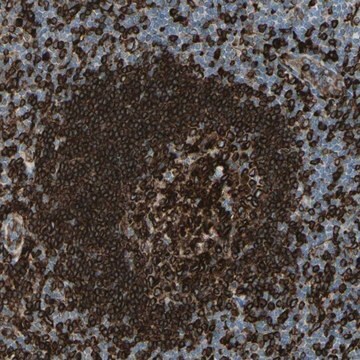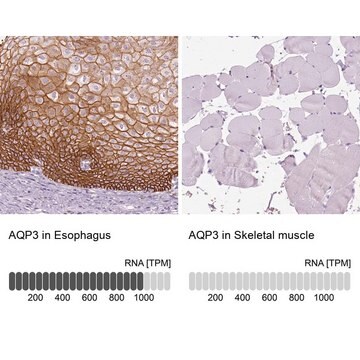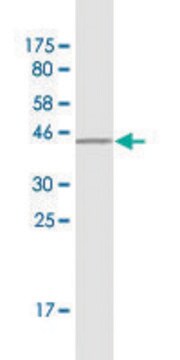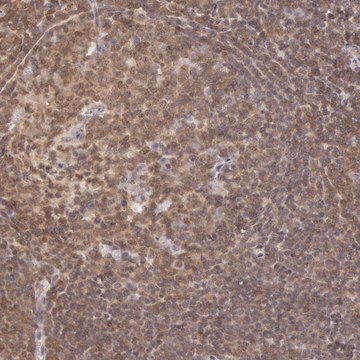HPA012012
Anti-PIGR antibody produced in rabbit

Prestige Antibodies® Powered by Atlas Antibodies, affinity isolated antibody, buffered aqueous glycerol solution, Ab2
Sinónimos:
PIGR Antibody - Anti-PIGR antibody produced in rabbit, Pigr Antibody, Anti-Hepatocellular carcinoma-associated protein TB6, Anti-PIGR, Anti-Poly-Ig receptor, Anti-Polymeric immunoglobulin receptor
About This Item
Productos recomendados
origen biológico
rabbit
conjugado
unconjugated
forma del anticuerpo
affinity isolated antibody
tipo de anticuerpo
primary antibodies
clon
polyclonal
Línea del producto
Prestige Antibodies® Powered by Atlas Antibodies
formulario
buffered aqueous glycerol solution
reactividad de especies
human
validación mejorada
orthogonal RNAseq
Learn more about Antibody Enhanced Validation
técnicas
immunoblotting: 0.04-0.4 μg/mL
immunohistochemistry: 1:500-1:1000
secuencia del inmunógeno
LLFSVVINQLRLSDAGQYLCQAGDDSNSNKKNADLQVLKPEPELVYEDLRGSVTFHCALGPEVANVAKFLCRQSSGENCDVVVNTLGKRAPAFEGRILLNPQDKDGSFSVVITGLRKEDAGRYLCGAHS
Nº de acceso UniProt
Condiciones de envío
wet ice
temp. de almacenamiento
−20°C
modificación del objetivo postraduccional
unmodified
Información sobre el gen
human ... PIGR(5284)
Descripción general
Inmunógeno
Aplicación
The Human Protein Atlas project can be subdivided into three efforts: Human Tissue Atlas, Cancer Atlas, and Human Cell Atlas. The antibodies that have been generated in support of the Tissue and Cancer Atlas projects have been tested by immunohistochemistry against hundreds of normal and disease tissues and through the recent efforts of the Human Cell Atlas project, many have been characterized by immunofluorescence to map the human proteome not only at the tissue level but now at the subcellular level. These images and the collection of this vast data set can be viewed on the Human Protein Atlas (HPA) site by clicking on the Image Gallery link. We also provide Prestige Antibodies® protocols and other useful information.
Acciones bioquímicas o fisiológicas
Características y beneficios
Every Prestige Antibody is tested in the following ways:
- IHC tissue array of 44 normal human tissues and 20 of the most common cancer type tissues.
- Protein array of 364 human recombinant protein fragments.
Ligadura / enlace
Forma física
Información legal
Cláusula de descargo de responsabilidad
Not finding the right product?
Try our Herramienta de selección de productos.
Código de clase de almacenamiento
10 - Combustible liquids
Clase de riesgo para el agua (WGK)
WGK 1
Certificados de análisis (COA)
Busque Certificados de análisis (COA) introduciendo el número de lote del producto. Los números de lote se encuentran en la etiqueta del producto después de las palabras «Lot» o «Batch»
¿Ya tiene este producto?
Encuentre la documentación para los productos que ha comprado recientemente en la Biblioteca de documentos.
Nuestro equipo de científicos tiene experiencia en todas las áreas de investigación: Ciencias de la vida, Ciencia de los materiales, Síntesis química, Cromatografía, Analítica y muchas otras.
Póngase en contacto con el Servicio técnico